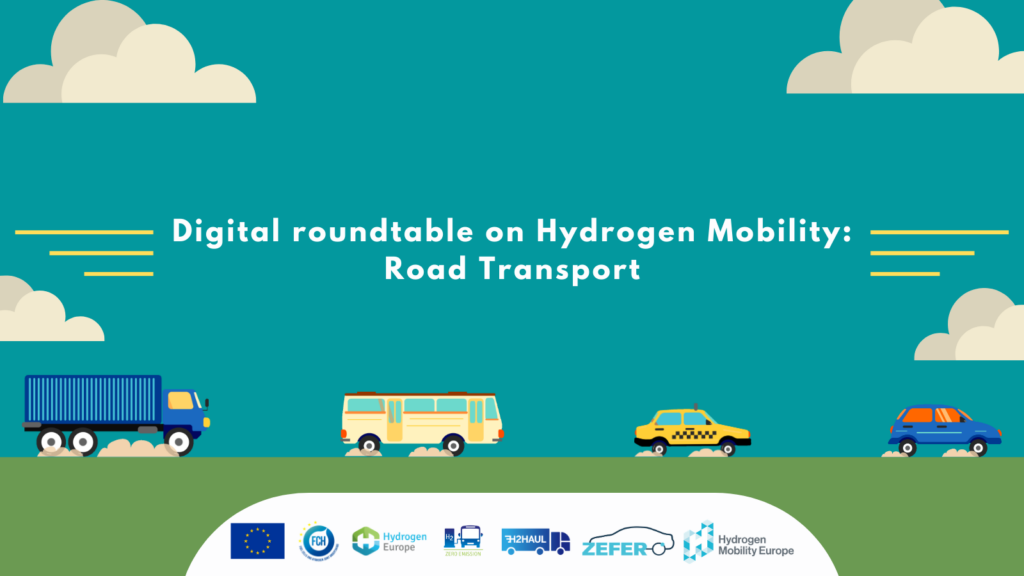A high-level roundtable on hydrogen mobility took place on Tuesday 17th November, bringing together MEPs, government representatives and experts on hydrogen to discuss the contribution of hydrogen to the European Green Deal objective of carbon neutrality by 2050.
MEPs and representatives from the European Commission struck a positive tone on the role hydrogen must play as an enabler of both transport decarbonisation and a renewably powered society and stressed its convenience and flexibility of use. Additionally, participants commented on how they expected hydrogen technology development to foster European industry competitiveness and secure future-oriented jobs, as well as to retain employment across Europe. All speakers noted that a robust European legislative and financial framework (e.g. CEF blending) would need to be established to allow hydrogen mobility technology to be rapidly scaled across Europe in the coming years so it can fulfil its potential.
The event was a partnership between the European Commission’s Fuel Cells and Hydrogen Joint Undertaking (FCH JU), Hydrogen Europe and the EU’s flagship projects demonstrating hydrogen road transport applications: H2ME & H2ME 2 (passenger cars and light commercial vehicles), JIVE & JIVE 2 (buses), ZEFER (passenger cars in commercial use) and H2Haul (trucks). Speakers specifically highlighted the instrumental role that the FCH JU has played in kickstarting hydrogen mobility in Europe and the importance of securing a sufficient amount of funding in the next research and innovation partnership.
On fuel cell buses, the number of cities deploying these zero-emission buses for future transport was shown to be growing substantially thanks to the JIVE and JIVE 2 projects, the projects alone deploying nearly 300 buses. Thanks to joint procurements and economies of scale, JIVE and JIVE 2 have further seen a growing number of European bus manufacturers offering fuel cell models at more competitive prices, thus showing increasing industry competitiveness. These projects also represent a practical example of the use of different EU funding streams, as the hydrogen infrastructure in some locations is co-funded via CEF (via the MEHRLIN project). Access to joint funding streams and synergies between different funding and financial instruments was stressed as an essential tool to accelerate hydrogen mobility uptake.
Progress was also identified regarding heavy-duty trucks. With EU carbon targets requiring a 15% reduction for this sector by 2025 and at least a 30% reduction by 2030, suppliers are pushing to develop zero-emission alternatives. The H2Haul project has been established as the first step in this direction with European suppliers deploying fuel cell trucks in four locations across Europe. Speakers noted that the expansion of hydrogen refuelling infrastructure in appropriate locations is crucial to facilitate the decarbonisation of heavy-duty transport, and the importance of linking the European TEN-E and TEN-T corridors was highlighted by different speakers. Calls were made for ambitious targets on hydrogen refuelling infrastructure deployment to be included in the upcoming revision of the Alternative Fuels Infrastructure Directive (AFID) as well as reviewing and linking the important TEN-T and TEN-E corridors.
The importance of highly utilised hydrogen refuelling stations to the uptake of hydrogen passenger vehicles is something that has been brought into sharp relief by the H2ME project. Both the H2ME and ZEFER projects have demonstrated competitive business cases through the deployment of clusters of ‘captive fleet’ fuel cell vehicles (e.g. taxis) with high mileage. The H2ME recommendation for European, national, regional and local incentives to create a level playing field – in a technology-neutral approach – for the deployment of hydrogen mobility technology was ultimately shared by the roundtable speakers as they concluded their arguments.
Thanks are extended to the speakers that came together to facilitate such a constructive dialogue: MEP Marian-Jean Marinescu, Mr Bart Biebuyck (Director of the FCH JU), Mr Herald Ruijters (Director in DG MOVE, European Commission), MEP Christophe Grudler, Mr Adam Mutwil (Head of division, electromobility, charging and hydrogen infrastructure, German Ministry for Transport and Digital Infrastructure), MEP Ismail Ertug, Mr Lorenz Jung (Chief Project Officer, H2Mobility Deutschland), Ms Lisa Ruf (Senior Principal Consultant, Element Energy), Mr Patrick Cnubben (Manager, New Energy Coalition), and Mr Marco Liccardo (Head of Trucks Global Product Line, CNH Industrial/IVECO) as well as to Mr Jorgo Chatzimarkakis, Secretary-General of Hydrogen Europe, who moderated the event
The Fuel Cells and Hydrogen Joint Undertaking (FCH JU) is a Public-Private Partnership in which the European industry, research, academia (represented by Hydrogen Europe and Hydrogen Europe Research) and the EU (represented by the European Commission) work together to accelerate the deployment of fuel cell and hydrogen technologies. The FCH JU supports a wide range of projects, which help to put the EU at the forefront of research and innovation, bring the benefits of the technology to the citizens and enhance industry competitiveness.
